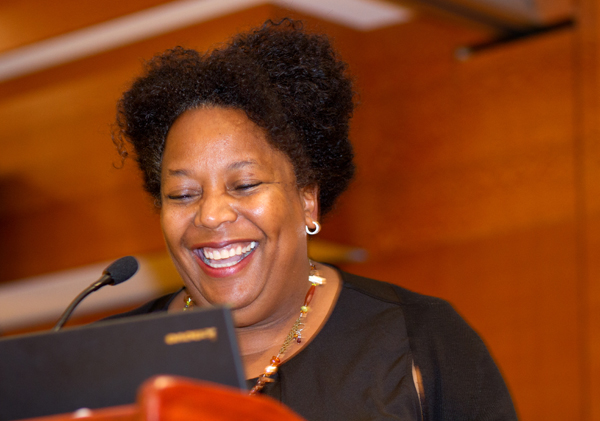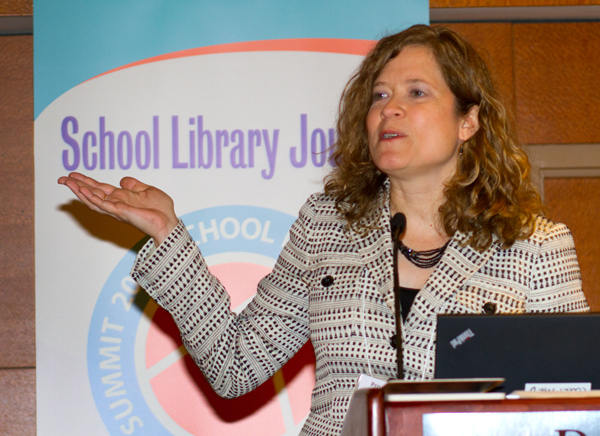Fast Learning at the 2015 SLJ Summit
A teen technology "Mover & Shaker" and Sabrina Urquhart of the Bezos Foundation were among the Fast Learning presenters at SLJ's 2015 Leadership Summit. Attendee Andy Plemmons covered the rapid fire session.
From Pinwheels to Vroom

Sabrina Urquhart, manager of Students Rebuild at the SLJ Leadership Summit. ©Karen Ducey Photography.
The nonprofit Bezos Family Foundation offers multiple opportunities for our students to experience rigorous and inspired learning environments from birth through high school. Sabrina Urquhart, manager of Students Rebuild, shared the foundation’s many programs with summit attendees. Vroom is a program that teaches us all to take everyday moments and turn them into opportunities to expand our brains. Through five simple steps, we can all remember ways to engage young learners in conversation that pushes their thinking. Connecting our students to the greater world and tackling issues that matter can be a critical opportunity for libraries. Our students may not be able to fundraise, but they deserve an opportunity to be part of something that makes an impact on those in need. Students Rebuild is a program we can engage with students at all grade levels to support important global concerns.. In this program, students create a symbol assigned by the project. For example, the project is currently accepting pinwheels for Syrian youth in conflict areas. For each pinwheel, Students Rebuild will donate $2 to the Healing Classrooms Program. As librarians, we can take a program like this and connect the content to multiple grade level standards within our schools. We can collaborate internationally and connect our students to share their efforts with one another all while supporting a global cause. Finally, through both the Bezos Scholar program and the Aspen Challenge, high school students can be inspired by dynamic speakers on community or global issues. These students have opportunities to look carefully at topics that affect their local communities and develop bold solutions that could be supported through seed grant money. As school librarians, we should be seeking out these kinds of global opportunities for our students. By harnessing our connected resources, school libraries have the power to connect students with authentic issues and amplify dynamic solutions.BiblioTec

Seth Ciotti, teen technology librarian at Kitsap (WA) Regional Library. ©Karen Ducey Photography.
In another example of empowering student voice, Seth Ciotti, teen technology librarian at Kitsap (WA) Regional Library and 2015 Library Journal Mover and Shaker, shared his story of creating BiblioTec, which serves at-risk and homeless youth. Through this 100-hour program at Kitsap, teenagers have the opportunity to explore multiple STEM topics. After a 40-hour introduction, participants choose a focus and spend 40–90 hours developing a project around that focus. The remaining 10 hours are spent reflecting on the process, developing next steps, and showcasing the work for the community. Through the process, Ciotti has learned that it’s not about the gadgets that he provides—it’s the environment and the experience and what those lead to. Ciotti has taken these kids , equipped them with the tools and skill sets of a global workforce, and empowered them with a leadership opportunity within their own community.Taking Action

Priscille Dando, coordinator of library information services in Fairfax County VA. ©Karen Ducey Photography.
While much of the summit called on us to take action on behalf of our students, there was another call to rise up as leaders in our districts and states on behalf of our own profession. During the fast learning sessions, attendees heard from Priscille Dando, coordinator of library information services in Fairfax County VA, as well as a group of librarians representing the Vista (CA) Unified School District. In the face of severe budget cuts, Vista librarians are rising from the ashes by developing a plan to recreate what their school libraries should look like. Along the way, they are celebrating each small success with great enthusiasm. From the reinstatement of a teacher librarian for 16 elementary schools to a flexible schedule for technicians running school libraries, each success is a milestone. With a plan focused on libraries of the future, educational excellence, and innovation, these librarians are moving a culture of “Why is the librarian at this meeting? We aren’t talking about books” to a culture of librarians as instructional leaders. (See “How Three California Cities Fought to Save School Libraries.”) In her role as a district leader of librarians, Priscille Dando sees opportunities for us out there to change the world—but we have to be actively looking for them and seizing each moment. She believes that librarians are a small team with one of the biggest impacts in a district. Her attitude of “I don’t have to ask permission to do what is right for students” is a proactive approach to problem solving. Rather than wait on someone to ask for her help, she seeks out the issues of the district and looks for solutions through school library services. Dando encourages us to unearth the big issues in our own districts and take action, evaluate the impact, but be transparent throughout the whole process. Our administrators have many things that keep them up at night. If we can show that we can come up with a plan and put it into action, we don’t have to advocate about our worth. That will be evident through our actions.Be a transformational leader
The fast learning sessions raised questions. What do school librarians do when we don’t have a leader at the district level? What about librarians who serve multiple schools? The challenges that we face are all too real, and there are no easy answers. Summit attendees were challenged in the opening keynote by Marnie Webb to be extreme listeners. In that listening, we must identify our constraints, acknowledge them, then put them aside. My takeaway: We each have to take our own unique situations and consider the whole child. By accepting the invitation to step up and become a transformational leader, we are accepting the call to action to engage ourselves and our students in global opportunities that matter. In the words of Louisa May Alcott, as quoted by Priscille Dando in her closing: “I am not afraid of storms for I am learning to sail my ship.” Let’s not wait for someone to tell us what they need. Let’s do what we know is right for students, sail our library programs through the sun and the storms, and learn together along the way. The fast learning sessions were meant to spark ideas and conversations among us all. Attendees will continue to collaborate via social media using the #sljsummit hashtag. I've created a related Storify: "SLJ Summit Fast Learning (with images, tweets)." ABOUT THE AUTHOR: Andy Plemmons (http://expectmiraculous.com) is a Google Certified Innovator and school library media specialist at David C. Barrow Elementary in Athens, GA. His library program is grounded in transliteracy, participatory culture, and students as creators of content shared with the global community. He can be reached on Twitter: @plemmonsa.
RELATED
RECOMMENDED
CAREERS
The job outlook in 2030: Librarians will be in demand
CAREERS
The job outlook in 2030: Librarians will be in demand
ALREADY A SUBSCRIBER? LOG IN
We are currently offering this content for free. Sign up now to activate your personal profile, where you can save articles for future viewing






Add Comment :-
Be the first reader to comment.
Comment Policy:
Comment should not be empty !!!